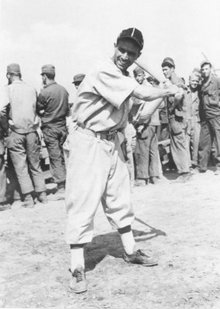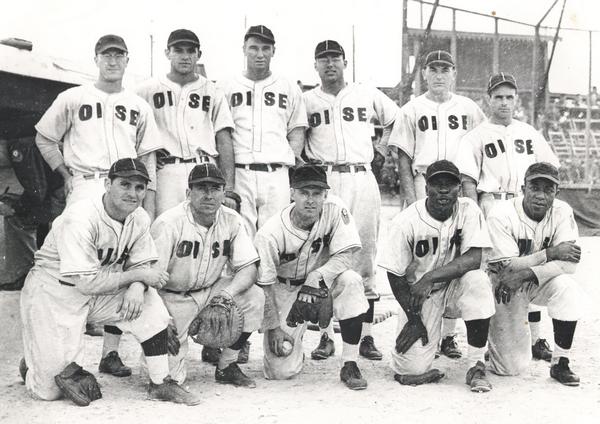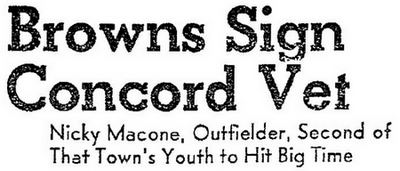

In Loving Memory of Nick Macone We carried you to Sleepy Hollow, Now we carry you in our hearts Susan, Anthony, Sally, Paul, Nick Jr. and Sharon |
Nick Macone
Date and Place of Birth: February 3, 1918 Concord, Massachusetts
Died: December 3, 2007 Concord, Massachusetts
Baseball
Experience:
Minor
League
Position: Outfield
Rank:
Master
Sergeant
Military Unit:
70th Ordnance Company
US Army
Area Served: Mediterranean and European Theater of Operations
 Nicholas
J “Nick” Macone was born
in
Nicholas
J “Nick” Macone was born
in
Following high school graduation, he and high school friend Jim Cullinane signed professional contracts with the Sydney Mines Ramblers of the Cape Breton Colliery League, a four-team league at the heart of the hard-nosed coal mining community of Nova Scotia in Eastern Canada. It was a pretty rough league and the local miners were diehard fans. A number of times the Princess Colliery failed to operate because most of the miners were at the ballgame. And the miners didn’t like their team losing - the Royal Canadian Mounted Police had to rescue umpires on a number of occasions at Brown Street Park.
Macone batted .271 in his 1938 rookie season with the Ramblers and his
.321 average in 1939 was third best in the league - he also stole 15
bases. But even the pitching talents of former Boston Brave, Al
Blanche, couldn't help the team out of the basement. After 1939,
the league disbanded with
On October 15, 1941, Macone entered military
service with the Army – one of six brothers to serve with the armed
forces in WWII. He was stationed at Aberdeen Proving Ground in
Macone was later sent overseas with the 70th Ordnance
Company and spent two years in North Africa and
Pretty soon,
the All-Stars
found themselves in the ETO World Series
where they would face the mighty Third Army team. The Third Army was
a star-studded outfit led by Cardinals’ outfielder
Harry “The Hat”
Walker and driven by a pitching staff that featured
Ewell “The Whip”
Blackwell of the Cincinnati Reds, who had already pitched a
no-hitter in the championship series and would go on to pitch a
no-hitter in the major leagues.
 |
| OISE All-Stars in Rheims, France 1945.
Nick Macone is back row, far right. Sam Nahem is back row
first left, Willard Brown is front row, fourth left and Leon Day is front row, far right. |
The
OISE All-Stars seemed to have little hope of getting a runner on
base let alone winning a game in the best-of-five World Series
against the Third Army – Ewell Blackwell had been unbeaten all
summer!
True to form, the Third Army easily overcame the All-Stars, 9 to 2,
before 50,000 cheering servicemen at Nuremberg Stadium,
The
Third Army came back with a vengeance in Game Four. Harry Walker hit
a two-run home run and Bill Ayers blanked the All-Stars, 5 to 0. The
deciding game saw the series return to Germany and despite the
support of 50,000 fans, the Third Army were unable to stop the
underdog All-Stars from creating a huge upset as they defeated – for
the second time – Cincinnati pitcher Ewell Blackwell. Macone had two
hits in the 2 to 1 victory, including his third double of the
series.
 |
| Lowell Sun February 15, 1946 |
Equipped with pro offers, Master Sergeant Macone returned home and
signed with the St Louis Browns in February 1946, joining the team
for spring training in
Macone,
who married Gertrude Peters in 1947, was a volunteer fireman and
worked for several years at Andy Boy Farm in
Macone
continued to tend his 40-acre farm in
Nick
Macone passed away at
February 3rd 1918 – December 3rd 2007
Nick was a remarkable athlete as well as being a skilled mechanic.
As a youth, he hit the ball so viciously its skin would tear off…
thus his nickname "Buster". After joining the army at the beginning
of World War II, he was attached to Armor where his job was to go in
early and supervise the setting-up of motor pools that serviced
tanks and other armored vehicles. He rose quickly to the rank of
Master Sergeant. When he was allowed time, he played baseball on
General Patton's prize winning team. Patton awarded him a gold wrist
watch for his prowess with glove and bat. Nick always regretted
losing that watch … up by Middlesex school while picking
blueberries.
One day after the invasion of Normandy a high ranking officer
appeared at his motor pool and ordered Nick into his command car.
Nick had no idea what was up. He was sure it had something to do
with some infraction of the rules, as he will run his shop with
complete autonomy (make that read Macone). After a long drive to
Cherbourg they pulled into the mansion that was headquarters for the
Allied Central Command. Nick was sure he was going to be shot.
They hustled up the stairs and into a large foyer where it seemed
that every bit of polished brass of the highest level (U.S. and
otherwise) was scurrying about planning the battle for France. The
officer that had brought him motioned to a door where two MP's stood
at guard "Go in there!" he ordered.
Cap in hand, Nick entered. There behind a very large desk sat
General Dwight David Eisenhower, Supreme Allied Commander. After a
few pleasantries, Ike said he had heard about Sgt Macone's skill
with a wrench, and told him the following story: It seems that Ike
had secured a big touring car in the States that he intended to use
as his command car in the European campaign. The car was in a ship
that got sunk in Cherbourg Harbor. It had been salvaged, and now
laid in a sad state of disrepair. He asked Nick if he could fix it.
Nick replied, "Yes Sir!"
It took a while, but before long Nick had it running again (he
couldn't remember if it was a Packard or a Buick). Before he gave
the touring car back to Ike, he took it for a spin to make sure
everything was working right. At the very high rate of speed, he was
run down by a couple of military police vehicles. The MPs wanted to
know where in hell this "dog face" ever got hold of a big touring
car like that, and why wasn't he where he was supposed to be. "Don't
you know there is a war going on? " Before long the story was
checked-out with headquarters and the MPs were quite impressed that
the little sergeant knew ""The Boss"".
Years later, when Ike became President of the United States, a
military vehicle pulled-up in the front yard of Nick's farm on
Fitchburg Turnpike. An officer stepped forth with a personal note
and commendation from the White House. Ike hadn't forgotten Nick
Macone… nor will any of us.
Thanks to Susan Macone and Sharon Bosse Macone, Nick’s daughter-in-law, for all
their help with this biography.
Created December 12, 2007. Updated January 13, 2009.
Copyright © 2007 Gary Bedingfield (Baseball in Wartime). All Rights Reserved.